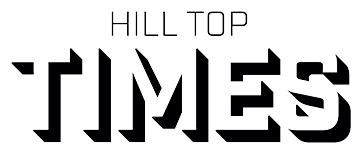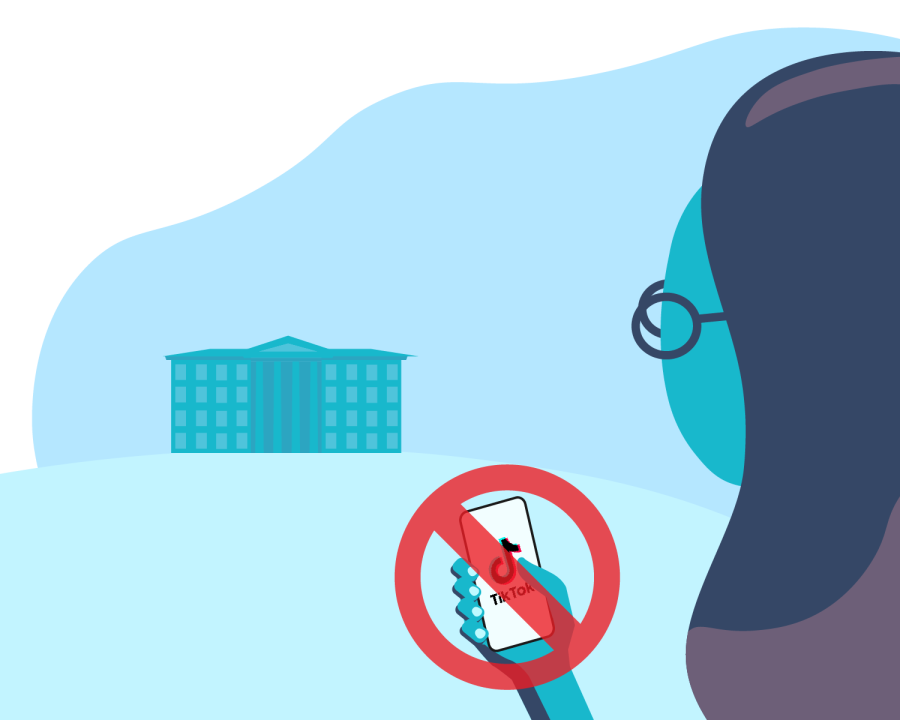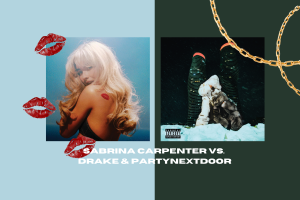Texas universities censor students with TikTok ban
A digitally constructed image created by junior Wes Phipps represents the new TikTok ban colleges are enforcing. “Without TikTok, a lot of my college friends now need to rely on other sources to gain a mental break and comfort,” senior Riya Meka said. “When students are depressed, it certainly affects the people around them, ultimately negatively impacting everyone as a whole.”
January 30, 2023
In response to Gov. Greg Abbott’s banning of the social media platform TikTok from all government issued devices, public universities across Texas are blocking access to the popular app on the campuses’ WiFi network. The University of Texas at Austin was the first to enact this policy on Jan. 16, while Texas A&M, UT Dallas, UT El Paso, etc. followed suit.
The video-sharing app allows people to embrace their creativity while creating content on various topics. From recording daily routines to performing short dances, TikTok is a hub for viral challenges and trends. However — on Dec. 7, 2022 — Abbott issued a letter ordering all state agencies to prohibit the app due to the “threat of the Chinese Communist Party to infiltrate the United States.” TikTok is owned by a Chinese tech giant known as ByteDance and its foreign ownership is causing concerns over national safety.
“While the federal government holds the ultimate responsibility for foreign policy issues, the state also has the responsibility and opportunity to protect itself,” Abbott said.
Due to the directive, each state agency has until Feb. 15 to issue a policy on TikTok with the governor’s office. Texas is not the first, as restrictions against TikTok date back to August of 2020
“Last session, the Texas Legislature took steps to protect certain critical infrastructure by passing the Lone Star Infrastructure Protection Act,” Abbott said. “Since then, we have gained information about growing threats posed by TikTok that require immediate action to protect our state’s sensitive information and critical infrastructure. This threat demands immediate vigilance from your agency, as set forth in this letter.”
Universities consist of an inventory of sensitive information, so many are aligning with state lawmakers’ decisions to protect the school by forbidding the app when connected to the university network. In spite of this, students and faculty are still able to use the app under their own personal WiFi.
“The university is taking these important steps to eliminate risks to information contained in the university’s network and to our critical infrastructure,” UT Austin technology advisor Jeff Neyland said in an email to students. “As outlined in the governor’s directive, TikTok harvests vast amounts of data from its users’ devices — including when, where and how they conduct internet activity — and offers this trove of potentially sensitive information to the Chinese government.”
Nonetheless, students are not pleased with the ban as they use the social media app on a daily basis as a source of entertainment.
“The banning simply impacts my day to day life by giving an annoyance to deal with when trying to access one of my sources of fun,” RHHS alum and A&M freshman Sudarshan Srikanth said. “I think that banning [the app] just makes people find workarounds such as using cellular data or a VPN instead of college WiFi, which just wastes time but doesn’t really stop the usage of the app like they intended.”
Texas Universities are not the only schools to ban the app. As of now, over a dozen schools throughout the country are either planning to or are partaking in the restriction including Auburn University, Oklahoma State University, Arkansas State University, etc.
“I absolutely do not believe that this is something that other colleges should adopt as a practice,” Srikanth said. “I believe they did this because they are interpreting the ownership of TikTok being of a different nationality as a direct threat to national security. I think that the people pushing for the ban either have an ulterior motive or they are paranoid about the unknown but probably for unnecessary reasons.”
TikTok is especially prominent among adolescents, as young adults (ages 16-24) comprise 60% of active users, thus, making up a large portion of college students. Regardless, there are people who tend to not download TikTok after noticing the cultural influence it has on the current wave of media.
“Personally, after seeing how much my friends were influenced and affected, I decided not to download the app,” senior Riya Meka said. “However, in my opinion, I think our government should focus on more serious topics such as gun laws instead of targeting a social media platform. TikTok is an app that entertains a lot of people and could be detrimental if it is suddenly banned.”
Due to the addictive nature of the app, students are inclined to use it as a mental health break from their stressful life. Censoring TikTok would remove access to these relaxing outlets people depend on to momentarily escape from reality.
“Not everyone uses TikTok to procrastinate, but a lot of users watch funny videos to make their day better, or watch some motivating and therapeutic videos, or even learn some new hacks or gain advice,” Meka said. “Everyone is different and has a unique way of coping with stress and I certainly do not think the TikTok ban is the solution.”
According to Wallaroo Media, the average TikTok user is on the app for 95 minutes per day, as of January 2023. As a result, organizations are using the app to share important information in an engaging manner.
“As a part of StuCo and Media, we have shifted to rely on social media such as Instagram and TikTok for announcements and student engagement, since these are sources where most students in our generation prefer to receive the news about everything today,” senior Veronika Volcjak said. “I think that if Rock Hill were to apply this ban, and continue limiting media use, the overall student activity and spirit would decline.”
Furthermore, the platform also allows for schools to show their character through unique ways while attracting a larger audience.
“Seeing actual students do “Instagram takeovers” or “TikTok Interviews” on student-run university accounts has really helped me feel more engaged, connected, and welcome at the school, which has really been helpful to hear perspectives from students even without having visited or attended the school,” Volcjak said. “The absence of the use of these platforms at schools may make universities seem less appealing, and wouldn’t attract as many people to apply.”
In a tweet, Sen. Josh Hawley (R-MO) recently announced his plans to introduce a bill to completely ban the app. Meanwhile, the list of schools following through with censoring TikTok continues to grow.
“The students affected by this ban are adults, and should be respected for their own choices on their devices,” Volcjak said. “In the end, [students] are likely paying thousands of dollars for their education, so, at that point, if they choose to spend their class time on TikTok, that’s their problem. But, in general, most students are mature enough to spend their time on TikTok wisely, and those who are responsible shouldn’t be suffering under bans that are unnecessary in their case.”










